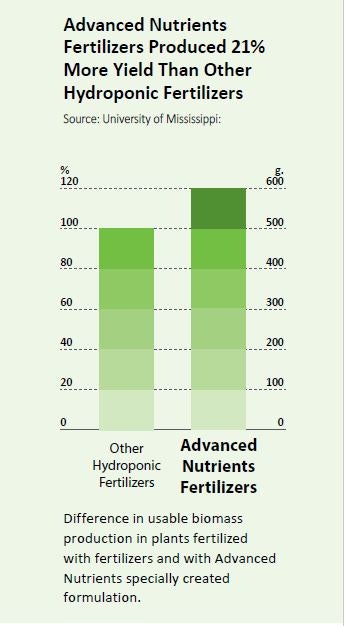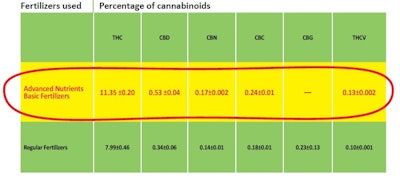The following is an excerpt from taken from “Eliminating Heavy-Metal Toxicity in Medical Marijuana, to Produce Patients’ Medicine Safer Than Drinking Water…” a research white paper authored by Julian Karadjov, Ph.D. of the Bulgarian Academy of Sciences, published with permission from Advanced Nutrients.
In this white paper, we covered the research and scientific proof that properly fertilized cannabis is safer for both the plant and the people consuming it. Next, we will show you the research confirming Advanced Nutrients fertilizers increase bud weight, THC and cannabinoids. Scientists are humans and may be biased. A second, independent opinion by other scientists emotionally detached from the testing is the highest standard of testing available. Let us give you the results of one such independent study confirming that Advanced Nutrients fertilizers are proven better than other hydroponic fertilizers. The then-only scientific institution authorized to carry out cannabis research in the USA—the Mississippi State University—did the experiment. It was completed by the team of Research Prof. M.A. ElSohly from the Plant & Soil Department at the University. The field experiment’s design was simple and straightforward—to compare the yield and quality of medicinal cannabis grown with the best available hydroponic fertilizers and the fertilizers offered by Advanced Nutrients, specially developed and optimized for your favorite plant.

A head-to-head comparison
More than a decade ago, when the research was realized, fertilizers used for growing sorghum and corn were considered best for growing cannabis. A plot 1,000-square-feet large (about 100 sq. m) was used to grow cannabis with these two types of fertilizers. Scientists would call this a control group of plants, or a control plot. In order to have a fair comparison, the plants on the control plot received basic fertilizers only, without sophisticated additives.
Another plot, the same size as the control plot, would be called the experimental plot. It was sown with cannabis that was fed with the newly developed Advanced Nutrients fertilizers. In order to have a fair comparison, the plants on the experimental plot received basic fertilizers only, and the other received Advanced Nutrients. Clearly, as you can see for yourself in the included research, the difference in the results was quite dramatic when using nutrients precisely tuned for cannabis, compared to the results when using a general-purpose fertilizer. The experimental plants gave a substantially stronger harvest in terms of both usable biomass and potency in comparison with the second set of control plants. See the original report, as released by Mahmoud A. ElSohly, PhD. Research Professor, and his team at the University of Mississippi [on the following pages within the white paper].
As a side note, this study was conducted in 2003 on the first generation of Advanced Nutrients fertilizers. We are now in our eighth generation of improvements on these original formulations. This is why a more recent BC Research Inc.’s study showed the concentration of medically active cannabinoids was almost double the results from the 2003 University of Mississippi experiment.
In other words, our formulations are nearly twice as effective now, after eight generations of continual improvements—meaning these formulations have almost doubled the potency of beneficial cannabinoids and THC compared to when first tested over 10 years ago.
THC and other cannabinoid levels were significantly higher in the Advanced Nutrients grown cannabis plants.

Source: University of Mississippi
Above chart images courtesy of Advanced Nutrients





















